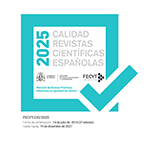Integrating podcasts in the EFL classroom. A case study in 1º E.S.O.
Abstract
This paper aims to report a podcasting study case while interrogating how useful it can be in the makings of an EFL classroom with positive learning outcomes. It is applied research in 1º E.S.O that operates on the main working hypothesis that there is a significant positive correlation between the use of podcasting and student’s engagement. Likewise, it seeks to preclude the notion that podcasts are a cure-all practice to undesirable learning outcomes. I shall draw from two sources of data to identify this possible correlation. First, an initial recollection of student’s attitudes through qualitative data, namely, questionnaires on two bilingual and a non-bilingual group of 1º E.S.O to comprehensively illustrate the state of the subject. Second, a final teacher’s assessment of the process-performance tasks to ponder grades as quantitative data helpful to uphold the avowed success. Within the field of social constructivism, this case is undergirded by previous literature recommendations on how to use podcasts, which the best integration scenarios are and some pedagogical considerations concerning information processing and how to enhance students’ output in the English as a Foreign Language (EFL) classroom.
Downloads
Article download
License
In order to support the global exchange of knowledge, the journal Complutense Journal of English Studies is allowing unrestricted access to its content as from its publication in this electronic edition, and as such it is an open-access journal. The originals published in this journal are the property of the Complutense University of Madrid and any reproduction thereof in full or in part must cite the source. All content is distributed under a Creative Commons Attribution 4.0 use and distribution licence (CC BY 4.0). This circumstance must be expressly stated in these terms where necessary. You can view the summary and the complete legal text of the licence.









